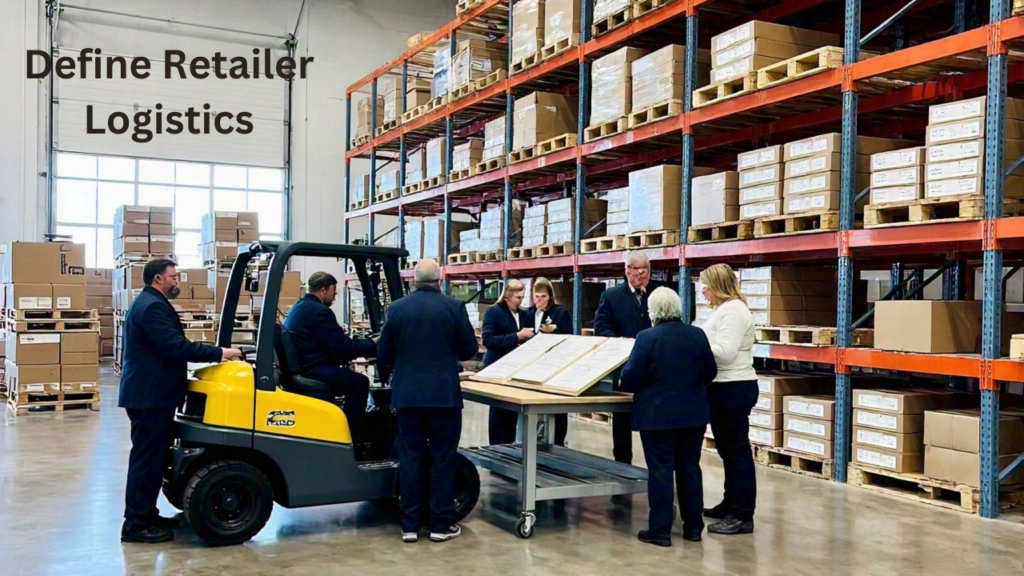Retail supply chain management therefore, is the system of managing the inflow of the products from suppliers to the guest. It involves all other operations such as warehousing, force control, transportation and distribution. The efficient management of logistics operation has thus become critical for retail success since it ensures timely distribution of products to the customer, in good condition at competitive costs.
This composition will claw into the rudiments of agitating its factors, challenges, and the significant impact it has on a retailer’s business performance define retailer logistics. By understanding and optimizing logistics processes, businesses can streamline operations, reduce costs, and ameliorate client satisfaction.
What Are the Key Elements to Define Retailer Logistics?
The world of define retailer logistics is vast and multifaceted. At its core, it involves a mix of strategy, technology, and functional prosecution. To completely grasp the significance of logistics in retail, it’s essential to explore its crucial factors.
- Force Chain Collaboration The foundation of Retail distribution lies in how well a business can coordinate its force chain. This includes establishing strong connections with suppliers, icing timely deliveries, and reducing supereminent times. Effective force chain operation ensures that products are always available when demanded, helping help stock outs and overstock situations.
- Force Control Proper operation of force is pivotal to meeting client demand without incurring inordinate costs. force systems, frequently backed by real- time shadowing technology, help retailers cover stock situations and make informed opinions about reordering and storehouse. Retailers may use styles similar as just- by- time( JIT) to reduce warehousing costs by entering products only when demanded.
- Warehousing and Distribution How goods are stored and transported from storages to retail locales or guests plays a critical part in overall logistics. The position of storages, force distribution strategies, and fulfillment processes all impact how snappily and efficiently products can be delivered.
- Transportation Logistics This element involves opting the stylish modes of transport for moving products, whether through road, air, rail, or ocean. Transportation opinions are told by delivery timelines, costs, and product conditions. Timely transportation is vital to meet client prospects for fast and dependable service.
- Technology Integration The part of technology in Retail fulfillment system can not be exaggerated. Advanced tools similar as storehouse operation systems( WMS), transportation operation systems( TMS), and artificial intelligence( AI) help optimize routes, manage stock, and read demand. These technologies streamline processes and enable retailers to offer better service at lower costs.
Challenges Impacting Retail Logistics
Managing logistics is n’t without its hurdles. Retailers frequently face several challenges that can impact their capability to maintain effective operations. Then are some of the most common logistics- related challenges
- Force Chain dislocations unanticipated events similar as natural disasters, political insecurity, or transportation issues can beget significant dislocations in the force chain. These dislocations may delay shipments, increase costs, and detriment client connections.
- Cost operation While logistics is essential, it can also be precious. Transportation, warehousing, and force operation costs can snappily accumulate. Chancing ways to optimize these processes is essential to maintaining profitability without compromising service quality.
- Reverse Logistics Handling returns efficiently is a crucial challenge for numerous retailers. Effective rear logistics processes can reduce the strain of returns while perfecting client satisfaction. A smooth returns process not only enhances the client experience but also minimizes the fiscal impact of returns on the business.
- Environmental Sustainability In an age where sustainability is decreasingly important, retailers face pressure to reduce their carbon footmark. Fromeco-friendly packaging to route optimization for reducing energy consumption, the demand for sustainable logistics practices is rising.
The Importance of Efficient Supply Chains
Optimizing Retail supply chain offers several crucial benefits for businesses in the competitive retail sector
- Cost Reduction Streamlining logistics operations helps businesses reduce transportation costs, minimize waste in the force chain, and avoid gratuitous stock. These savings can significantly ameliorate profit perimeters.
- Bettered client Satisfaction Timely deliveries, accurate orders, and smooth returns processes are critical to keeping guests happy. Effective logistics systems insure that products are delivered on time, in perfect condition, and with minimum hassle.
- More Inventory Management Retailers who work technology to optimize force can insure they’ve the right products in stock without overstocking. This reduces the threat of holding obsolete or slow- moving force and helps retailers respond snappily to request demands.
- Scalability Effective logistics processes allow businesses to gauge operations easily. As demand grows, the logistics structure can expand without causing dislocations, allowing retailers to handle larger volumes while maintaining effectiveness.
Key Advantages of Efficient Logistics
- Faster Order Fulfillment Well- optimized logistics insure products are snappily reused and packed to guests.
- Cost Savings Proper logistics operation helps reduce storehouse, transportation, and force- related costs.
- Client Retention Reliable and accurate delivery services make client trust, which leads to reprise business.
- Request Expansion Effective logistics allow retailers to expand into new requests without compromising service quality.
The Role of Data Analytics in Logistics
In moment’s fast- paced retail terrain, data analytics has come a game- changer in optimizing logistics operations. By employing the power of big data, retailers can gain precious perceptivity into colorful aspects of their logistics processes, from tracking force situations to prognosticating demand trends. Advanced data analytics tools allow retailers to read deals patterns, optimize delivery routes, and ameliorate stock loss strategies. These perceptivity enable businesses to make data- driven opinions that enhance effectiveness, reduce costs, and anticipate client requirements. Retailers who embrace data analytics in their logistics operations are n’t only perfecting functional effectiveness but also gaining a competitive edge in the request by offering briskly, more dependable, and cost-effective services
The Impact of E-Commerce on Logistics
The rise ofe-commerce has significantly converted Retail distribution presenting both openings and challenges. With the adding demand for online shopping, retailers are needed to reevaluate their logistics strategies to meet client prospects for fast delivery and easy returns. E-commerce has led to a swell in direct- to- consumer models, taking effective and flexible logistics systems to handle lower, more frequent orders. also, the growth of omnichannel merchandising where guests buy products online and pick them up in- store — has introduced complications in managing force across multiple deals channels. To stay competitive, retailers must invest in integrated logistics systems that enable them to seamlessly manage both physical stores and online orders, icing a smooth and harmonious client experience across all touchpoints.
Conclusion
Define Retailer logistics plays a vital part in maintaining effective retail operations, perfecting client satisfaction, and reducing functional costs. By integrating crucial rudiments similar as force chain collaboration, force operation, warehousing, and transportation, retailers can optimize their logistics systems to more meet consumer demand and request trends.
While the challenges in logistics can be significant, fastening on results like using technology and espousing sustainable practices will help retailers remain competitive and responsive in the fast- paced retail terrain.
For businesses looking to streamline their operations and enhance client satisfaction, optimizing Retail distribution is a pivotal step towards long- term success.
Important Takeaways
- Effective force chain operation is pivotal for timely product vacuity and cost control.
- Force operation technologies help streamline stock situations and help redundant force.
- Transportation logistics directly impact delivery speed and client satisfaction.
- Sustainability in logistics is getting a precedence for retailers aiming to meet consumer prospects and reduce environmental impact.
- Optimized logistics systems can lead to significant cost savings, better client service, and business growth.


